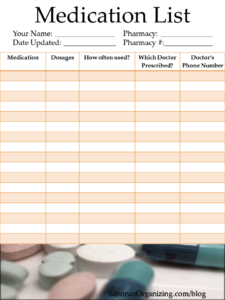Is Polypharmacy Destroying Your Health?
Overdosing is not just an epidemic for “the younger generation”. It is also epidemic among our geriatric population. In order to understand what is happening among our older adults, you’ll want to familiarize yourself with some new vocabulary words.
A Quick Story
Let’s consider a veteran of the Korean War, Jack, aged 75. Jack has a number of health issues. He suffers from the early stages of Alzheimer’s, and has been a diabetic for 25 years. Careless management of his diabetes set off a domino effect resulting in heart disease and kidney disease. These mounting health problems have led our veteran to being diagnosed with depression. Currently, he is seeing the following physicians who prescribe various medications to treat his conditions:
Primary care physician
Endocrinologist (diabetes)
Cardiologist (heart),
Nephrologist (kidney)
Neurologist (Alzheimer’s)
Psychiatrist (depression)
In addition to his having multiple physicians, our veteran is also served by his Veterans’ Administration physicians. It should come as no surprise that the over-prescribing and cross prescribing led to a rapid deterioration of his condition. Alarmed, Jack’s family members intervened and Jack was admitted to the hospital. Once it was discovered that Jack’s prescribed medications were causing toxic reactions, the process of deprescribing commenced.

What is Polypharmacy?
Polypharmacy refers to the use of a large number of medications, commonly considered to be the use of five or more. Since polypharmacy is a consequence of having several underlying medical conditions, it is much more common in elderly patients.
Another Story
As written in the Washtington Post, Canadian pharmacist and clinical scientist at the Bruyere Research Institute in Canada, Barbara Farrell, describes what she encountered when she began working at a geriatric hospital in Ottawa nearly two decades ago.
One of Farrell’s most memorable successes involved a woman in her late 70s who used a wheelchair and was nearly comatose.
“She would literally slide out of her chair,” Farrell recalled. The woman was taking 27 drugs four times per day and had been diagnosed with dementia and a host of other ailments.
After reviewing her medications, Farrell and her colleagues were able to weed out duplicative and potentially harmful drugs and reduce the doses of others. A year later, the woman was “like a different person”: She was able to walk with a cane and live mostly independently, and she reported that her doctor said she did not have dementia after all.
When Farrell asked another patient why she was taking thyroid medication, the woman replied that her doctor had prescribed it for weight loss after her last pregnancy — in 1955.
What is Deprescribing?
According to an article published in U.S. Pharmacist entitled “Addressing the Polypharmacy Conundrum”, deprescribing is a term that has been proposed by prescribers to help minimize polypharmacy. It is a decision-making process aimed at tapering and/or stopping medications.
In order to avoid polypharmacy, individuals (and/or caregivers) must be diligent about keeping current records of their prescribed drugs as well as any over the counter drugs they may take. Also, use just one pharmacy and review all medications with the respective pharmacist as well as your prescribing specialists. Furthermore, take notice of, correct, and question any medications listed on Electronic Health Records that might be incorrectly recorded.
Conclusion
Although there are numerous ways to keep your list of prescriptions up-to-date, a sample Medication List would look something like this:

Hopefully, you’ll start this process today so that you can live the healthiest life possible! Good luck!